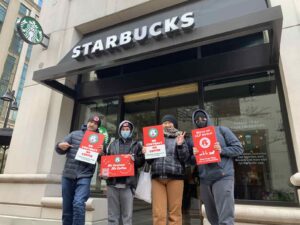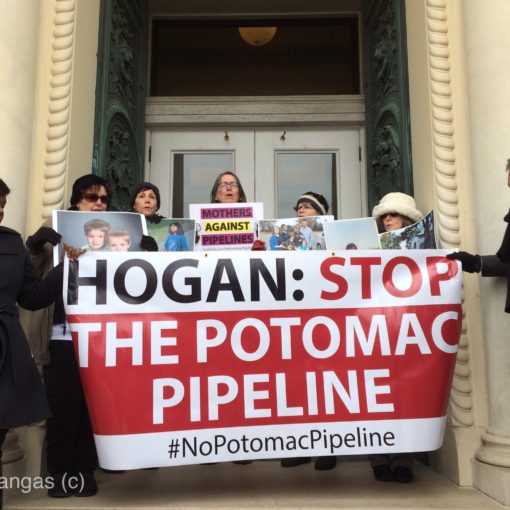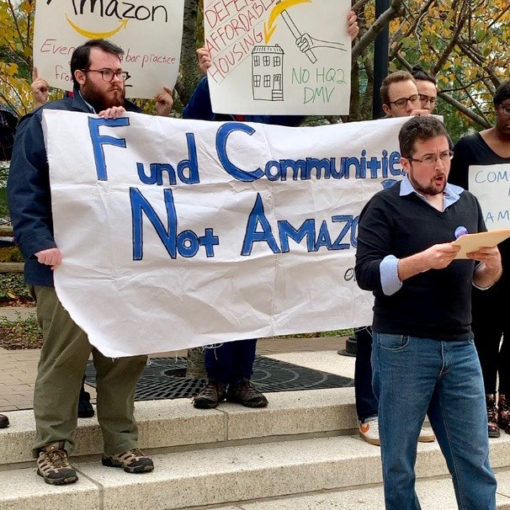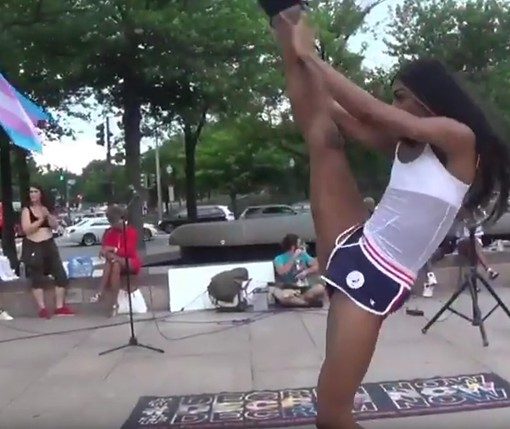
Arlington, Virginia—One year ago it would have been unthinkable that leaders from every major U.S. labor union would show up to support a small group of baristas at the Courthouse Arlington Starbucks. But seven baristas who recently voted to form a union at the Courthouse Arlington Starbucks were swarmed with union support from across the DC-Maryland and Virginia region. Unions promised to stand with and give undivided support to Starbucks baristas in their negotiations for collective bargaining rights with Starbucks corporation.
Union leadership from the AFL-CIO, Teamsters, SEIU 512, DC Nurses, Teachers Unions, and many other unions joined hands in solidarity for Starbucks Workers United, the union working to gain collective bargaining rights for Starbucks baristas across the country. So far baristas at 270 Starbucks coffee shop locations have voted to unionize.
Over 1000 Baristas went on a “Double Down” strike in nearly 100 coffee shops on Friday, December 16. The 3 day strike was scheduled to last until Sunday, but some coffee shop employees voted to strike only for a day. The Starbucks at Arlington Courthouse, a coffee shop in Northern Virginia, close to Washington DC, voted to strike for 1 day. The collective action was unprecedented and hit Starbucks in its pockets as customers were turned away Friday morning from nearly 100 closed coffee shops.
“A year ago today, a group of working class baristas organized the first unionized Starbucks store in the United States. In the span of one year, we went from ZERO unionized Starbucks stores to 270 and almost 7,000 union workers.” Starbuck Workers United tweeted on 9 December, the anniversary of the successful vote to unionize their first store in Buffalo, New York.
“We are not anti-Starbucks. We are Starbucks! We cannot reach our full potential if we are understaffed, overextended, exhausted, and burned-out,” Starbucks Workers United wrote on its website. So far Starbucks Workers United has not called for a product boycott but has urged other union members not to give Starbucks gift cards this holiday.
Organizers of the Double Down Strike asked supporters to sign a petition on the Union website. Organizers were also seeking donations of support for striking baristas because, of course, they were not getting paid for striking. The union was compensating baristas a portion of their lost wages to minimize the economic strain it would cause them.
The wave of labor union support couldn’t be coming at a better time for Starbucks baristas as Starbucks has ramped up pressure against union organizers at stores voting to unionize. Starbucks Workers United reported bullying from managers, sudden shift changes, reduced hours, firings for small infractions, and store closures for employees and stores voting to unionize.
Starbucks Workers United has filed over 900 worker complaints on behalf of its workers with the National Labor Relations Board, a government agency set up to arbitrate issues between corporations and employees. The complaints were reported since the first Starbucks voted to unionize on December 9, 2021, and they stem from bullying, firings, and sudden store closures at locations voting to unionize.
On November 17, Starbucks Workers United membership organized a “Red Cup Rebellion” strike which closed over 200 stores for a day. It signaled Starbucks executives that the union was committed to negotiating for improved working conditions for baristas. But Starbucks corporate officials still declined to negotiate a collective bargaining agreement.
Starbucks Workers United may become known as the ‘little union that could’ if union organizers successfully negotiate livable wages, stable shifts, 40 hour work weeks, and affordable benefits, which are some of the key issues impacting baristas.
Wave Of Bullying Comes After Union Vote
Sam Dukore, a shift supervisor at the Arlington Courthouse Starbucks said Starbucks is not negotiating with the union. His efforts with other baristas at Courthouse Arlington Starbucks to get better working conditions has centered it in what may turn out to be a major battle in the labor movement for worker’s rights to collective bargaining. But voting to ‘go union’ has come with a cost.
Dukore said that after September 30 when his store employees announced their intention to vote on whether or not to join the union, management began to pressure workers with write-ups for minor infractions. The work culture shifted as management used micro-aggressive tactics to bully baristas, according to Dukore. The write-ups were issued for infractions that before then were rarely given at the Arlington Courthouse Starbucks. The write-ups became even more common place after the Arlington Courthouse Starbucks voted to unionize on November 7.
Write-ups were filed against barristas for being late to a shift clock-in by 1 minute, even though baristas had been at the store for their health check. Baristas are not allowed to clock in until their health check is completed. Other write-ups included uniform infractions for improper shoes and write-ups for jeans with small holes or tears, something management did not monitor before the union vote, according to Dukore.
The write-up system is the basis Starbucks uses to terminate employment. Write-ups spell out that a barista can be terminated at any point and it does not follow any particular escalation path. Dukore feels the Starbucks termination system is ambiguous and being used arbitrarily to retaliate. The feeling is that a flurry of write-ups are being used to punish baristas at his store for voting to unionize.
Without a union, Starbucks regards its baristas as ‘at-will’ employees and under the Virginia State labor statutes, can terminate employment without a reason. At-will employment means that an employer can terminate an employee at any time for any reason, except an illegal one, or for no reason without incurring legal liability. Likewise, an employee is free to leave a job at any time for any or no reason with no adverse legal consequences, according to the National Conference of State Legislatures website.
The work environment at the Arlington Courthouse Starbucks became more adversarial and stressful after the union vote, according to Dukore.
One of the Arlington Courthouse Baristas was fired this week but the facts of their termination were not available to DCMediaGroup. Starbucks Workers United has not yet signaled whether it will file an complaint with the NLRB in this case.
Bullying was reportedly happening at other locations such as in Memphis, Tennessee where a Federal Judge ordered Starbucks to reinstate seven baristas it had fired for organizing and voting to join the union.
We Will Stand With You And Behind You
There’s nothing like a friend that stands with you in a time of need and that was the theme spoken by Liz Shuler, President of the AFL-CIO, a labor union representing over 12 1/2 million U.S. workers.
“Workers said enough is enough. They were tired of being treated with a lack of dignity and respect,” said Shuler. “We aren’t asking for much. We are going to keep fighting until we get a contract with Starbucks Workers United right in front of the labor movement leading the way.”
Leadership from every major union joined Shuyer in a vow to support Starbucks Workers United.
Shuler said that 12 1/2 million workers were at her shoulder and her message was clear, “if you have a union thats how you’re protected.”
Starbucks Succeeds But Baristas Left Behind
Starbucks reported in its digital magazine it had 15,444 locations, of which about 9,000 shops were licensed by their corporate headquarters as of January 2022. It also claims over 33,000 locations in 80 countries globally. With a reported $116 billion in gross revenue globally, why would a large corporation like Starbucks fight workers’ efforts to join a union? Its about money and power sharing, said George Atallah, Assistant Executive Director of External Affairs, NFL Players Association.
The NFL Player’s Association has joined in collective union efforts to compel Starbucks CEO, Howard Shultz to respect Starbucks baristas and their efforts to unionize and negotiate with Starbucks Workers United for a collective bargaining agreement. Starbucks attorneys have so far walked out of every meeting within a few minutes of the start of negotiations, refusing to bargain in good faith with Starbucks Workers United representatives, according to Atallah.
“Two issues we have found in our experience with management where they are not interested in negotiations in good faith are money and control,“ said Atallah. “There is plenty of money to go around [but] it can be terrifying to corporations to cede some of that control to its work force,” said Atallah. It is because “they are effectively unable to do what they want.”
For now Starbucks’ profit is very good for CEO Howard Schultz, a billionaire worth $3.7 billion who also owns a super yacht he named “Pi”. Valued at $118 million, it features a glass-bottom swimming pool, spa facilities, and a helipad, and can accommodate 12 guests and has a crew of 18. It is a crown jewel of Starbucks’ opulence. Schultz has also gone on a stock buyback spree, amassing over 210,000 additional shares earlier this year which he added to the $1.75 billion in Starbucks stock he already owns.
Shultz is opposed to unionization, but as a wealthy billionaire with a glass bottom swimming pool in his 254 foot super-yacht, why would a successful corporation with excellent revenue flow with everything going for it not fight workers’ efforts to join a union?
Atallah looks at it this way, “Even if their practices are unfair, unjust, and not right, those things [worker’s rights] are not in line with the win-wins we talk about with labor management. They don’t get to just keep all they money for themselves and not treat the employees fairly. There has to be a way where a happy barista means revenue for the company.”





